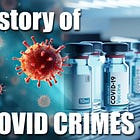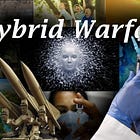Survival in an Age of Manufactured Consent
Propaganda, false norms, and hidden remedies reveal both danger and opportunity in the wake of crisis
This is part three of a talk I gave in Saskatoon. The COVID "pandemic" revealed how propaganda reshaped society, how collective perception can entrap people in compliance, and how alternative approaches to healing, including nicotine (used correctly), may hold overlooked potential. Survival today depends not on waiting for institutions to reform, but on cultivating resilience, rejecting false norms, and reclaiming responsibility for both health and community.
Thank you to Dr. Francis Christian for hosting this event and giving a great introduction. You can visit his Substack to explore his powerful reflections on philosophy, science and more.
Please support the Trozzi Team’s mission to drive solution-oriented research, raise awareness, empower the public, and foster meaningful change through dedicated grassroots efforts.
The Duty to Survive and Protect
Every generation carries the responsibility to survive and bring forth the next, ensuring the continuation of humanity. Our ancestors endured hardships so that we could inherit the gift of life, and now it is our turn to shoulder that same duty. The COVID agenda, through its assault on life, has reminded us of the importance of this responsibility and opened doors to stronger, more resilient communities.
Propaganda and the Creation of False Norms
The “pandemic” demonstrated how propaganda can manipulate perception at a scale once unimaginable. Lockdowns, face masks, and endless televised fear created a manufactured reality, convincing people that submission was normal and necessary.
Old experiments on social conformity, such as Solomon Asch’s famous line test, revealed that many people will accept falsehoods simply because those around them agree on the wrong answer. In Asch’s studies, participants were asked to identify which of three comparison lines matched the length of a reference line. They would be surrounded by actors who intentionally chose the incorrect option, and most subjects simply went along with the actors due to social pressure.
This dynamic was weaponized during the "pandemic," producing a culture of compliance that resembled cult-like conditioning. However, when people encountered communities grounded in reality rather than illusion, many awakened and rediscovered their own judgment.
Breaking Free from Manufactured Consensus
The path forward lies not in persuading the majority, but in uniting the small fraction willing to see clearly. History shows that determined minorities—as small as 3.5% of a population—can spark profound change. By gathering, asking questions, and creating spaces of genuine dialogue, individuals can help others escape the trance of false consensus.
Rethinking Remedies and the Role of Nicotine
Beyond social control, the health consequences of the COVID injections demand urgent solutions. Research has identified spike proteins as a major cause of harm, binding to both ACE2 and nicotinic receptors. This has drawn attention to nicotine as a potential protective agent, possibly shielding receptors from spike protein damage.
While smoking is harmful, nicotine in safer forms such as patches or lozenges may offer therapeutic value. Some already report benefits in easing adverse events, and although not a cure, nicotine could be an overlooked tool in a broader survival toolkit—one that merits deeper research.
Building Strength Through Truth
The "pandemic" revealed both the destructive power of lies and the resilience of truth. Propaganda can reshape norms, but it cannot extinguish reality. By honoring our duty to survive, refusing to accept manufactured illusions, and exploring overlooked remedies, we can emerge better prepared for the future.






